| Listing 1 - 10 of 27 | << page >> |
Sort by
|
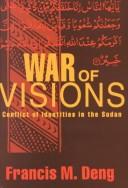
ISBN: 0815717946 9780815717935 9780815717942 0815717938 0815723695 0585388180 Year: 1995 Publisher: Washington, D.C. Brookings Institution
Abstract | Keywords | Export | Availability | Bookmark
 Loading...
Loading...Choose an application
- Reference Manager
- EndNote
- RefWorks (Direct export to RefWorks)
The civil war that has raged intermittently in the Sudan since independence in 1956 is a conflict of contrasting and seemingly incompatible identities in the Northern and Southern parts of the country. Identity is seen as a function of how people identify themselves and are identified by others in terms of race, ethnicity, culture, language, and religion. The identity question relates to how such concepts determine or influence participation and distribution in the political, economic, social, and cultural life of the country. War of Visions sheds light on the anomalies of the identity conflict and presents competing models: the Arab-Islamic mold of the North, representing two thirds of the country in territory and population, and the remaining Southern third, which is indigenously African in race, ethnicity, culture, and religion, with an educated Christianized elite. But although the North is popularly defined as racially Arab, the people are a hybrid of Arab and African elements, with the African physical characteristics predominating in most tribal groups. This configuration is the result of a historical process that stratified races, cultures, and religions and fostered a "passing" into the Arab-Islamic mold that discriminated against the African race and cultures. The outcome of this process is a polarization that is based more on myth than on the realities of the situation. The identity crisis has been further complicated by the fact that Northerners want to fashion the country on the basis of their Arab-Islamic identity, while the South is decidedly resistant.
National movements --- Sudan --- Soudan --- Politics and government --- Politique et gouvernement --- 800 Collectie Vlaams Vredesinstituut --- 810 Theorie en Methode --- 812 Ideologie --- 815 Geschiedenis --- 821.1 Volkenrecht --- 826 Imperialisme, Kolonialisme --- 836 (Multi-)nationale ondernemingen --- 841 Politiek Bestel --- 842.1 Propaganda --- 844.1 Minderheden --- 845 Religie --- 846 Identiteit --- 846.1 Etniciteit --- 850 Vrede- en conflictstudies --- 851 Burgeroorlogen --- 856.1 Conflictpreventie --- 860 (Vredes)cultuur --- 881.3 Noord-Afrika --- Regions & Countries - Africa --- History & Archaeology
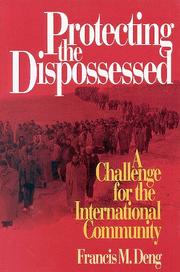
ISBN: 0815718268 Year: 1993 Publisher: Washington, D.C. Brookings Institution
Abstract | Keywords | Export | Availability | Bookmark
 Loading...
Loading...Choose an application
- Reference Manager
- EndNote
- RefWorks (Direct export to RefWorks)
International movements --- Refugees --- 813 Methodologie --- 815 Geschiedenis --- 821.5 Mensenrechten --- 822.1 Verenigde Naties --- 844.3 Migratie en vluchtelingen --- 844.5 Gezondheid --- 844.6 Samenlevingsproblemen --- 850 Vrede- en conflictstudies --- 855 Oorlogsvoering --- 858 Geweld --- 881.1 Oost-Afrika --- 881.3 Noord-Afrika --- 881 Afrika --- 882.3 Midden-Amerika --- 883.3 Zuidoost-Azië --- 884.1 Oost-Europa --- 884.3 Zuid-Europa --- Displaced persons --- Persons --- Aliens --- Deportees --- Exiles --- Government policy
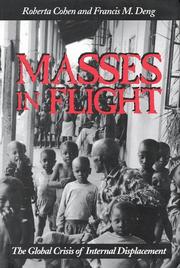
ISBN: 0815715110 Year: 1998 Publisher: Washington D.C. The Brookings Institution
Abstract | Keywords | Export | Availability | Bookmark
 Loading...
Loading...Choose an application
- Reference Manager
- EndNote
- RefWorks (Direct export to RefWorks)
Eén van de grootste humanitaire problemen waarmee de wereldgemeenschap thans te maken heeft is het fenomeen van "internally displaced persons", ontheemden die in eigen land verblijven maar hun normale woonplaats, meestal omwille van oorlogsgeweld hebben verlaten. Dit boek waarvan één van de auteurs de Vertegenwoordiger van de VN secretaris-generaal voor Internally Displaced Persons is, gaat in op diverse aspecten van de problematiek zoals het verlenen van bijstand, het internationaal juridisch kader, de rol van NGO's en diverse regionale benaderingen van het probleem.
Forced migration. --- Humanitarian assistance. --- Internally displaced persons. --- Migration, Internal. --- Refugees. --- 821 Internationaal Recht --- 830 Economie --- 841 Politiek Bestel --- 843 Middenveld --- 844.3 Migratie en vluchtelingen --- 850 Vrede- en conflictstudies --- 856.1 Conflictpreventie --- 856.5 Humanitaire interventies --- Forced migration --- Humanitarian assistance --- Internally displaced persons --- Migration, Internal --- Refugees --- Displaced persons --- Persons --- Aliens --- Deportees --- Exiles --- Internal migration --- Mobility --- Population geography --- Internal migrants --- Displaced persons, Internally --- IDPs (Internally displaced persons) --- Internally displaced people --- Internally displaced populations --- Humanitarian aid --- International relief --- Cleansing, Ethnic --- Compulsory resettlement --- Ethnic cleansing --- Ethnic purification --- Involuntary resettlement --- Migration, Forced --- Purification, Ethnic --- Relocation, Forced --- Resettlement, Involuntary
Book
Year: 1998 Publisher: Washington, D.C. Brookings Institution
Abstract | Keywords | Export | Availability | Bookmark
 Loading...
Loading...Choose an application
- Reference Manager
- EndNote
- RefWorks (Direct export to RefWorks)
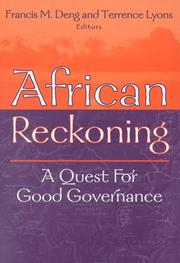
ISBN: 0815717849 Year: 1998 Publisher: Washington, D.C. Brookings Institution
Abstract | Keywords | Export | Availability | Bookmark
 Loading...
Loading...Choose an application
- Reference Manager
- EndNote
- RefWorks (Direct export to RefWorks)
Politics --- Polemology --- Africa
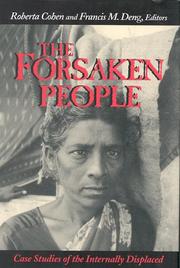
ISBN: 0815715145 Year: 1998 Publisher: Washington D.C. Brookings Institution Press
Abstract | Keywords | Export | Availability | Bookmark
 Loading...
Loading...Choose an application
- Reference Manager
- EndNote
- RefWorks (Direct export to RefWorks)
Internally displaced persons of ontheemden, zijn mensen die binnen hun eigen land op de vlucht zijn als gevolg van oorlog of geweld. In 1997 waren er naar schatting zo'n 20 miljoen in 35 landen. Al deze mensen moeten opgevangen worden en hopen eens naar huis terug te keren. Dit boek brengt tien gevalsstudies bij elkaar van landen die te maken hadden met grootschalige interne vluchtelingenstromen. In Afrika zijn dat Rwanda, Burundi, Liberia en Sudan. Voor Europa komen het voormalige Joegoslavië en de Kaukasus aan bod. In Azië Tadjikistan en Sri Lanka en in Latijns-Amerika Columbia en Peru. Telkens wordt ingegaan op de oorzaken van het probleem en worden strategische aanbevelingen voor hulpverleners gedaan.
Forced migration --- Internally displaced persons --- Migration, Internal --- Refugees
Book
ISBN: 0815719744 Year: 1992 Publisher: Washington, D.C. : The Brookings Institution,
Abstract | Keywords | Export | Availability | Bookmark
 Loading...
Loading...Choose an application
- Reference Manager
- EndNote
- RefWorks (Direct export to RefWorks)
For nearly a decade, international efforts to combat famine and food shortages around the globe have concentrated on the critical situations in sub-Saharan Africa. In the Sudan, the largest country in Africa, prolonged drought, complicated by civil strife and debilitating economic problems, has caused widespread human suffering. The Sudan illustrates the proverbial worst-case scenario in which urgent food needs have been denied, food has been used as a weapon, and outside assistance has been obstructed. The Challenges of Famine Relief focuses on the two famine emergencies in the Sudan in the 1980s--the great African drought-related famine of 1984-86 and the conflict-related famine that afflicted the southern Sudan in 1988-91. Francis Deng and Larry Minear analyze the historical and political setting and the response by Sudan authorities and the international community. The book outlines four problem areas exemplified in the response to each crisis: the external nature of famine relief, the relationship between relief activities and endemic problems, the coordination of such activities, and the ambivalence of the results. The authors identify the many difficulties inherent in providing emergency relief to populations caught in circumstances of life-threatening famine. They show how such famine emergencies reflect the most extreme breakdown of social order and present the most compelling imperatives for international action. Deng and Minear also discuss how the international community, alerted by the media and mobilized by the Ethiopian famine, moved to fill the moral void left by the government and how outside organizations worked together to pressure Sudan's political authorities to be more responsive to these tragedies. Looking ahead, the authors highlight the implications for future involvement in humanitarian initiatives in a new world order. As recent developments in Eastern Europe and the former Soviet Union demonstrate, s.
Drought relief --- Droughts --- Famines --- Food relief
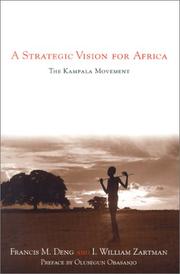
ISBN: 0815702647 0815702655 Year: 2002 Publisher: Washington, D.C. Brookings Institution
Abstract | Keywords | Export | Availability | Bookmark
 Loading...
Loading...Choose an application
- Reference Manager
- EndNote
- RefWorks (Direct export to RefWorks)
National security --- Sustainable development --- Sécurité régionale --- Développement durable --- Conference on Security, Stability, Development, and Cooperation in Africa. --- Africa --- Afrique --- Foreign relations --- Relations extérieures --- Third World: economic development problems --- Developing countries: economic development problems
Book
ISBN: 1601270348 9781601270344 9781601270351 1601270356 Year: 2008 Publisher: Washington, D.C. United States Institute of Peace Press
Abstract | Keywords | Export | Availability | Bookmark
 Loading...
Loading...Choose an application
- Reference Manager
- EndNote
- RefWorks (Direct export to RefWorks)
Public law. Constitutional law --- Politics --- Africa --- Group identity --- Identité collective --- Afrique --- Politics and government --- Politique et gouvernement --- Conflict resolution --- Constitutional conventions. --- Constitutional history --- Constitutional history. --- Diplomatic negotiations in international disputes --- Negotiation --- New democracies. --- Identité collective
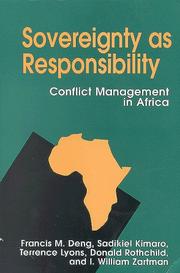
ISBN: 0815718284 Year: 1996 Publisher: Washington, D.C. Brookings Institution
Abstract | Keywords | Export | Availability | Bookmark
 Loading...
Loading...Choose an application
- Reference Manager
- EndNote
- RefWorks (Direct export to RefWorks)
Political sociology --- Colonisation. Decolonisation --- Africa
| Listing 1 - 10 of 27 | << page >> |
Sort by
|

 Search
Search Feedback
Feedback About UniCat
About UniCat  Help
Help News
News